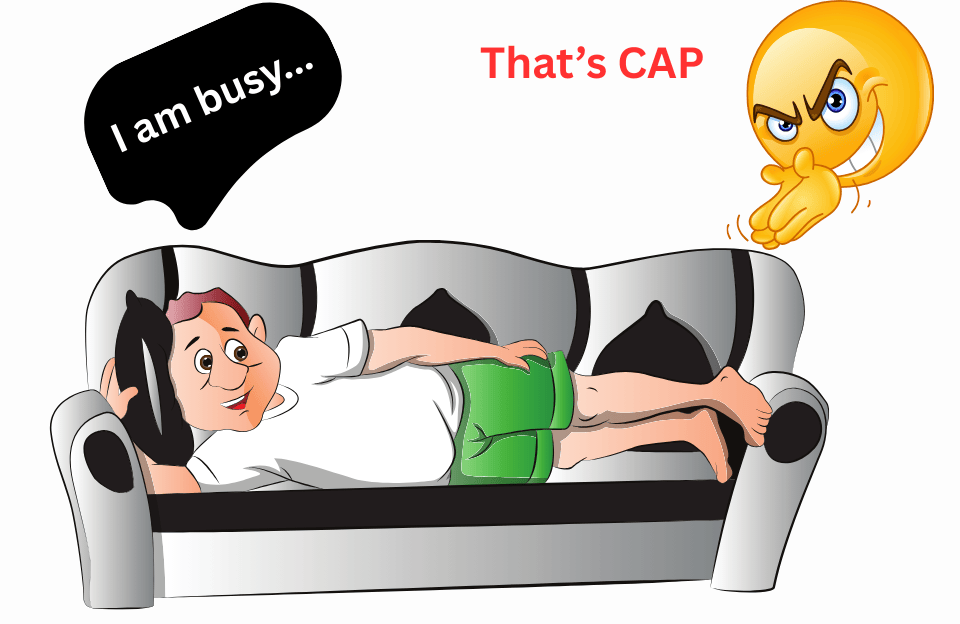If you’ve been scrolling through TikTok, Twitter (X), or Instagram lately, you’ve probably seen people saying “That’s cap” or “No cap.”
At first, it can sound like they’re talking about hats. But in Gen Z slang, cap has nothing to do with what you wear on your head. It’s all about truth, lies, and calling someone out.
Let’s break it down so you’ll never feel lost when you see cap in a post or hear it in a conversation.
Key Takeaways
- What does cap mean in slang? → It means a lie.
- No cap → Means truth or for real.
- Started in AAVE and became popular in rap and TikTok culture.
- Commonly used online with the 🧢 emoji to call out lies.
- It’s casual slang, so keep it for friends and social media, not formal situations.
Cap Slang Meaning: The Basics
In modern slang, especially among Gen Z, “cap” means a lie and “no cap” means truth.
Think of cap as a quick way to say:
- Cap → That’s a lie.
- No Cap → I’m telling the truth.
Example in conversation:
Friend 1: I just met Drake at the grocery store.
Friend 2: Bro, that’s cap.
Here, that’s cap means “You’re lying, I don’t believe you.”
Where Did ‘Cap’ Come From?
The slang cap has been around longer than most people think. It first appeared in African American Vernacular English (AAVE) in the early 1900s, but it became more common in rap culture in the 1990s.
Hip-hop artists like Future, Young Thug, and Migos helped make it popular in songs.
- Future – “No Cap” (2017): Brought the term into mainstream rap lyrics.
- Migos – “No Cap” references: Helped cement the term in youth culture.
By the late 2010s, social media made cap part of everyday Gen Z conversations.
What Does Cap Slang Mean on Social Media?
On platforms like TikTok, Instagram, and X (Twitter), cap works as a quick reaction.
You might see:
- 💯 No cap → “That’s 100% true.”
- Cap emoji 🧢 → “That’s a lie.”
Example from TikTok:
A user might post: “This is the best pizza in the world 🍕💯 no cap” — meaning they truly believe it’s the best.
How Gen Z Uses ‘Cap’ in Real Life
Even outside the internet, cap is common in casual talk.
Ways Gen Z Uses ‘Cap’:
- To call out lies
“You said you finished your homework? That’s cap.”
- To confirm honesty (with “no cap”)
“That concert was insane, no cap.”
- In a playful way (even when joking)
“I can run faster than a cheetah. No cap.”
Table: Cap Slang vs. No Cap Slang
| Term | Meaning | Example |
| Cap | A lie or false statement | “You said you won the lottery? Cap.” |
| No Cap | Truth or honesty | “This burger is amazing, no cap.” |
Why ‘Cap’ Matters in Gen Z Culture
Language isn’t just about words — it’s about belonging. Using slang like cap shows you understand the tone, humor, and inside jokes of Gen Z culture.
It’s also a quick way to express skepticism or truth without writing a long explanation.
Cap in Memes and Pop Culture
The cap slang trend exploded thanks to memes. The 🧢 emoji is now a universal signal for lying.
Example Meme:
Top text: “I’ll start going to the gym tomorrow.”
Bottom text: 🧢
Celebrities and influencers use cap all the time, from YouTube videos to tweets, which keeps it relevant in youth culture.
Common Mistakes People Make With ‘Cap’
If you’re new to this slang, here’s what to avoid:
- Using it in formal settings → Don’t say “That’s cap” in a job interview.
- Mixing up cap and no cap → Remember: cap = lie, no cap = truth.
- Overusing it → Using it too much can sound forced or cringe.
Quick Tips to Use Cap Slang Naturally
- Use cap when you don’t believe someone.
- Use no cap when you want to emphasize truth.
- The 🧢 emoji works for fun, casual contexts online.
Cap Slang in Other Languages
Interestingly, other cultures have similar slang words:
- UK: “That’s rubbish” or “Stop chatting.”
- Australia: “That’s a load of bull.”
- Spanish: “Mentira” (lie).
This shows that while cap is unique to AAVE and Gen Z slang, the concept of calling out lies is universal.
FAQs
Q1: What does cap slang mean?
Cap slang means a lie. When someone says “That’s cap”, they’re calling something false.
Q2: What does cap slang mean on TikTok?
On TikTok, cap means lying and no cap means telling the truth. People often use the 🧢 emoji for fun.
Q3: Who started saying cap?
The term comes from African American Vernacular English (AAVE) and became popular through rap music before spreading on social media.
Q4: Is saying cap rude?
It can be playful or serious. Among friends, it’s fine, but it might feel rude if said in a confrontational tone.
Q5: Is cap slang still popular in 2025?
Yes, it’s still trending on TikTok, Instagram, and in casual Gen Z conversations.

